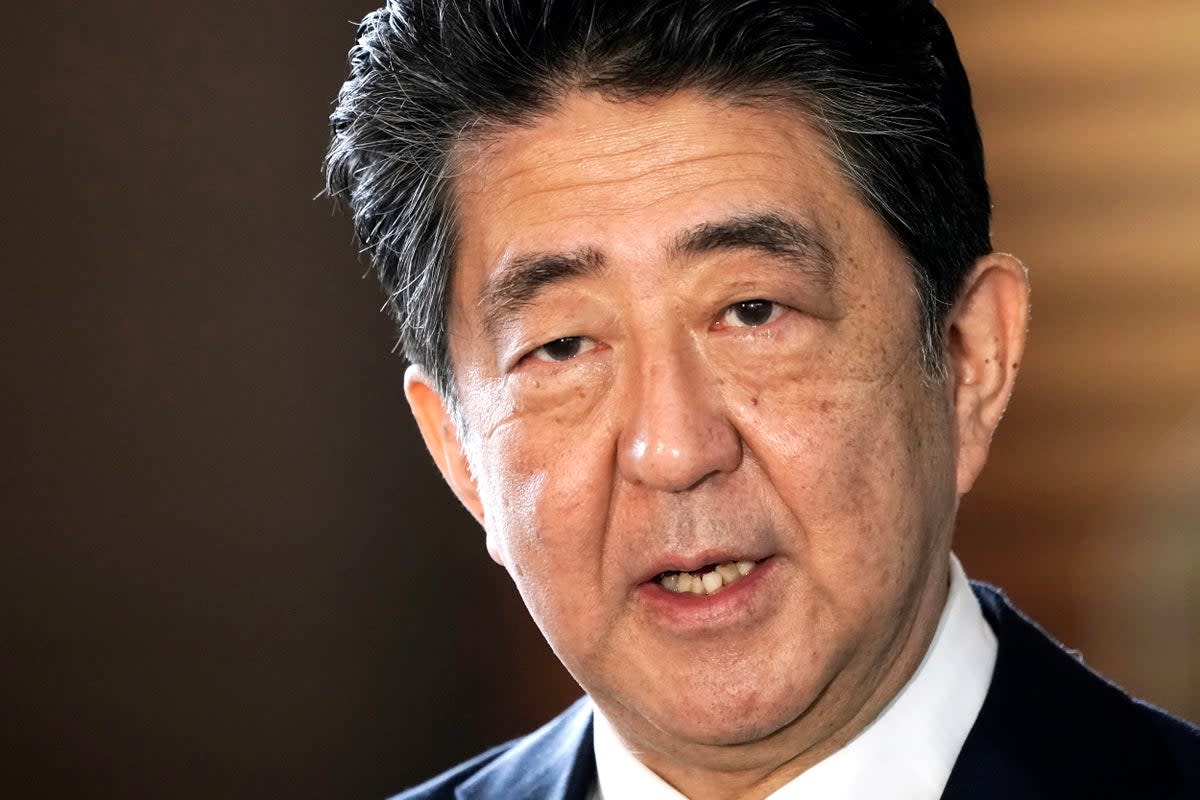Shinzo Abe - latest: Former prime minister dies after being shot, Japanese media says

Japan’s former prime minister Shinzo Abe has been shot while delivering a campaign speech in the western city of Nara and is showing no vital signs, reported Japanese media.
Local fire department official Makoto Morimoto said Mr Abe was in cardio and pulmonary arrest, or CPA, after being shot, meaning he was not breathing and his heart stopped while he was being airlifted to a hospital.
Two gunshots were heard at around 11.30am on Friday morning, witnesses say, as Mr Abe collapsed in the street. A male suspect has been detained from the scene and what appeared to be a rudimentary shotgun has been recovered by police.
Later in a televised address to the nation, prime minister Fumio Kishida said his predecessor was in “severe condition” in hospital.
Mr Kishida condemned the shooting as unforgivable, calling it a “dastardly and barbaric” act.
Police have arrested a 41-year-old man suspected of carrying out the shooting. Identified as Tetsuya Yamagami, a resident of Nara, he was a former maritime self-defence force member, reported Fuji TV.
He reportedly told police he was unhappy with the former Japanese prime minister and intended to kill him.
Footage aired by Japanese broadcasters showed Mr Abe lying on the street with several security guards running toward him. He was holding his chest when he collapsed, with his shirt smeared with blood.
Another video shows a cloud of smoke at the moment the gunshot rang out, though not the shooter themselves. TBS Television reported that Mr Abe appeared to have been struck on the left side of his chest and in the neck.
At the time of the attack the former prime minister was giving a speech ahead of Sunday’s election for the parliament’s upper house.
The attack comes as a particular shock in a country that ranks among the world’s safest and with some of the strictest gun control laws anywhere.
Some broadcasters described Mr Abe as being in “heart failure”, a term that formally means the heart cannot sufficiently pump blood and supply necessary oxygen to the rest of the body. In Japan, officials sometimes use this term in situations where victims are no longer alive but before a formal declaration of death has been made.
US ambassador to Japan Rahm Emanuel expressed sadness and shock at the shooting. "Abe-san has been an outstanding leader of Japan and unwavering ally of the US. The US government and American people are praying for the well-being of Abe-san, his family, & people of Japan," he said on Twitter.
Teuku Faizasyah, Indonesia’s foreign ministry spokesman, said in a statement on behalf of foreign minister Retno Marsudi: “The minister has expressed her sympathies in the name of G20 foreign ministers to the Japanese foreign minister.”
Taiwanese president Tsai Ing-wen condemned what she called “violent and illegal acts”.
“I believe everyone is as surprised and sad as I am. Taiwan and Japan are both democratic countries with rule of law. On behalf of my government, I would like to severely condemn violent and illegal acts,” she wrote on Facebook.
“Former prime minister Abe is not only a good friend of mine, but also a staunch friend of Taiwan’s. He has supported Taiwan for many years and spared no effort to promote the progress of Taiwan-Japan relations.”
"Shocking news from Japan that former PM Shinzo Abe has been shot - our thoughts are with his family and the people of Japan at this time,” said Australia’s prime minister Anthony Albanese.
Shocking news from Japan that former PM Shinzo Abe has been shot - our thoughts are with his family and the people of Japan at this time
— Anthony Albanese (@AlboMP) July 8, 2022
Mr Abe, 67, stepped down as prime minister in 2020 reporting that a chronic health problem had resurfaced. He has had ulcerative colitis since he was a teenager and has said the condition was controlled with treatment.
"What worries me most now is that because of my resigning, the conservative ideals that the Abe administration raised will fade," Mr Abe subsequently wrote in the magazine Bungei Shunju.
"From now on, I want to sacrifice myself as one lawmaker to make true conservatism take root in Japan."
He told reporters at the time that it was "gut-wrenching" to leave many of his goals unfinished.
He then launched a three-pronged "Abenomics" strategy to beat persistent deflation and revive economic growth with hyper-easy monetary policy and fiscal spending, along with structural reform to cope with a fast-aging, shrinking population.
He was instrumental in winning the 2020 Olympics for Tokyo, cherishing a wish to preside over the Games and even appeared as Nintendo video game character Mario during the Olympic handover.
His ultra-nationalism riled the Koreas and China, and his push to normalise Japan’s defense posture angered many Japanese. Mr Abe failed to achieve his cherished goal of formally rewriting the US-drafted pacifist constitution because of poor public support.
Additional reporting by agencies


